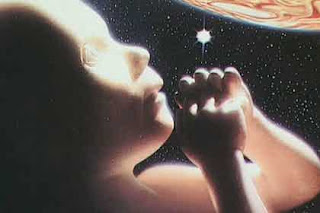Arthur C. Clarke, 1917-2008

"For though he was master of the world, he was not quite sure what to do next. But he would think of something." ~ 2001: A Space Odyssey
Arthur C. Clarke, visionary and writer of more than eighty books and hundreds of essays, died Wednesday at age 90 in Colombo, Sri Lanka. Dubbed the poet laureate of the space age by author David Brin, Clarke was both a scientific technical writer and a writer of fiction, penning classics such as Childhood’s End and Rendezvous with Rama, and collaborating with Stanley Kubrick on 2001: A Space Odyssey, which has been called the most important science fiction movie ever made.
Clarke was introduced to science fiction when he was twelve and discovered the pulp magazine Amazing Stories. This early addiction to fantastic fiction steered him at a later age towards imaginative writers such as H. G. Wells. Clarke began his writing career submitting short stories to a school magazine, but later had to quit school due to a lack of funds. His civil service job as an auditor supplied him with ample time to pursue his writing, and his membership to the British Interplanetary Society—a group of science fiction and space enthusiasts—led to the publication of some of his short stories.
In 1941 Clarke volunteered for the Royal Air Force, a move he called “the single most decisive move of my career.” There Clarke taught himself mathematical and electronics theory, and after the war he attended college and graduated with a degree in physics. In 1953 after two years as an assistant editor of a technical journal, Clarke’s Childhood’s End was published and he began earning enough money to write full time.
It took Clarke four years to write the novel 2001: A Space Odyssey, simultaneously working with Stanley Kubrick on the film project. The premise of the film is taken from Clarke’s short story “The Sentinel,” which tells the story of man's discovery of an artifact on the moon left by an ancient race.
Clarke was proud that his sense of wonder did not wane during his decades as a writer, and that he stayed true to the original form of his writing: “I regard it as something of an achievement not to have become cynical…I do remain an optimist, especially in my fiction, because I hope it may operate as a self-fulfilling prophecy."
To learn more about Arthur C. Clarke's life and works, visit the Biography Resource Center (library card is required)
Comments